Book contents
- Frontmatter
- Contents
- List of Figures
- List of Tables
- List of Contributors
- Preface
- 1 What Is Induction and Why Study It?
- 2 The Development of Inductive Reasoning
- 3 Interpreting Asymmetries of Projection in Children's Inductive Reasoning
- 4 Property Generalization as Causal Reasoning
- 5 Availability in Category-Based Induction
- 6 From Similarity to Chance
- 7 Theory-Based Bayesian Models of Inductive Reasoning
- 8 Use of Single or Multiple Categories in Category-Based Induction
- 9 Abductive Inference: From Philosophical Analysis to Neural Mechanisms
- 10 Mathematical Induction and Induction in Mathematics
- 11 Induction, Deduction, and Argument Strength in Human Reasoning and Argumentation
- 12 Individual Differences, Dual Processes, and Induction
- 13 Taxonomizing Induction
- Index
1 - What Is Induction and Why Study It?
Published online by Cambridge University Press: 26 February 2010
- Frontmatter
- Contents
- List of Figures
- List of Tables
- List of Contributors
- Preface
- 1 What Is Induction and Why Study It?
- 2 The Development of Inductive Reasoning
- 3 Interpreting Asymmetries of Projection in Children's Inductive Reasoning
- 4 Property Generalization as Causal Reasoning
- 5 Availability in Category-Based Induction
- 6 From Similarity to Chance
- 7 Theory-Based Bayesian Models of Inductive Reasoning
- 8 Use of Single or Multiple Categories in Category-Based Induction
- 9 Abductive Inference: From Philosophical Analysis to Neural Mechanisms
- 10 Mathematical Induction and Induction in Mathematics
- 11 Induction, Deduction, and Argument Strength in Human Reasoning and Argumentation
- 12 Individual Differences, Dual Processes, and Induction
- 13 Taxonomizing Induction
- Index
Summary
Why study induction, and indeed, why should there be a whole book devoted to the study of induction? The first reason is that inductive reasoning corresponds to probabilistic, uncertain, approximate reasoning, and as such, it corresponds to everyday reasoning. On a daily basis we draw inferences such as how a person will probably act, what the weather will probably be like, and how a meal will probably taste, and these are typical inductive inferences. So if researchers want to study a form of reasoning that is actually a pervasive cognitive activity, then induction is of appropriate interest.
The second reason to study induction is that it is a multifaceted cognitive activity. It can be studied by asking young children simple questions involving cartoon pictures, or it can be studied by giving adults a variety of complex verbal arguments and asking them to make probability judgments. Although induction itself is uncertain by nature, there is still a rich, and interesting, set of regularities associated with induction, and researchers are still discovering new phenomena.
Third, induction is related to, and it could be argued is central to, a number of other cognitive activities, including categorization, similarity judgment, probability judgment, and decision making. For example, much of the study of induction has been concerned with category-based induction, such as inferring that your next door neighbor sleeps on the basis that your neighbor is a human animal, even if you have never seen your neighbor sleeping. And as will be seen, similarity and induction are very closely related, many accounts of induction using similarity as their main currency (Heit & Hayes, 2005).
Finally, the study of induction has the potential to be theoretically revealing.
- Type
- Chapter
- Information
- Inductive ReasoningExperimental, Developmental, and Computational Approaches, pp. 1 - 24Publisher: Cambridge University PressPrint publication year: 2007
- 6
- Cited by

